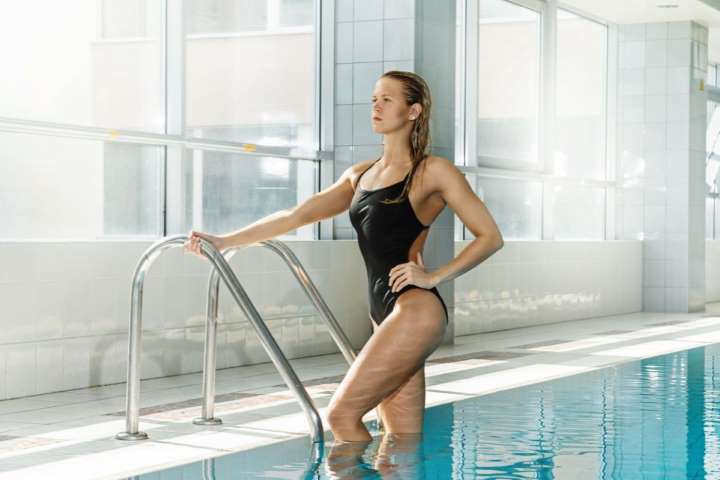
If you are only just getting into water sports, swimming, and outdoor activity, you may be blissfully unaware of the difference between a wetsuit and a swimsuit.
The best way to tell you the difference is that you have swimwear for summer in the form of bikinis, swimming shorts, and so on, and you have a wetsuit for surfing, diving, and more intense water sports than just a swim or a paddle.
Typically, a wetsuit is designed for activity in outdoor waters, and natural waters, such as lakes, rivers, and the sea. On the other hand, swimsuits are more for leisure and going to the swimming pool or a casual day at the beach.
But, let’s look more into it.

What Is A Swimsuit?
A swimsuit is a regular swimwear that you wear whenever you go out for standard swimming activity.
A wetsuit will give you an edge so not wearing one gives you a more even playing field, and since they restrict movement, many love swimsuits because it is less restrictive and feels more natural.
Swimsuits also mean that you need to acclimatize to whatever conditions you are in, and your body needs to get used to the cold.
So, even while swimsuits are more suited for standard swimming activities, a day at the beach, and a swim in the local pool, they are also often used in water sports.
With more and more people opting for swimsuits over wetsuits in outdoor swimming and water-based activities.

What Is A Wetsuit?
A wetsuit is a form of swimwear that is made to give you a much sleeker profile in the water, which allows you to swim much more smoothly. It is crafted from a material known as neoprene and will be classified by thickness on your torso and legs.
Wetsuits will offer a special coating that will minimize any friction in the water and enhance your speed when you swim
They also offer an extra layer of protection between the water and your skin, allowing you to feel safer as you swim in cold waters. Not only do they help you stay warmer in cold water though, but if you do end up injured, it will be less severe thanks to the extra layer.
Differences
Swimsuits are ideal for swimming in man-made pools as they offer resistance to chlorine. Wetsuits, instead, offer a full body of coverage, and will also offer 50+ UPF sun protection too.
Activity
They also differ in activity as well. Different open water activities will need different swimwear.
Wetsuits can be very pricey but are worth it as an investment for the buoyancy and warmth that they offer you. However, your own preferences will dictate your choice on this.
The weather will also be a major factor in choosing the ideal swimwear. Wetsuits are compulsory in waters below 18 degrees Celsius in some situations.
This rule is usually in place to avoid exposing outdoor swimmers to any extremely cold temperatures which can be a health risk.
An ideal wetsuit will trap water between your skin and the wetsuit, which does provide insulation between you and the suit, helping to maintain your bodily warmth.
Warmth
Speaking of which, a wetsuit will help to enhance how much heat your body can retain. When your wetsuit takes in water, your body will warm it up, making you feel warm at all times. So, you will not be exposed to dangerously cold temperatures.
Swimsuits do not do this at all.
You can get wetsuits that differ in thickness, so if you live in a warm climate, a thin wetsuit is ideal, but in colder areas, thicker wetsuits are available to help you to warm in even cooler waters.
Buoyancy
Finally, let’s consider buoyancy, which is very important in water.
A wetsuit gives your body a more streamlined shape, which will make your swimming feel very effortless. For less experienced swimmers, wetsuits can feel a bit like a safety net.
In wetsuits, even the best of swimmers can face difficulties when in open waters, but a wetsuit can create an over buoyancy, which leaves their chest over the water too much.
This can make them strain while swimming.
In a swimsuit, you will need to ensure you maintain a posture in which you are streamlined behind your head.
If you feel the strain on your hips when you kick you need to position your hips higher up and relax your muscles. Kicks should be small, and you should be able to lower your body in the water.





